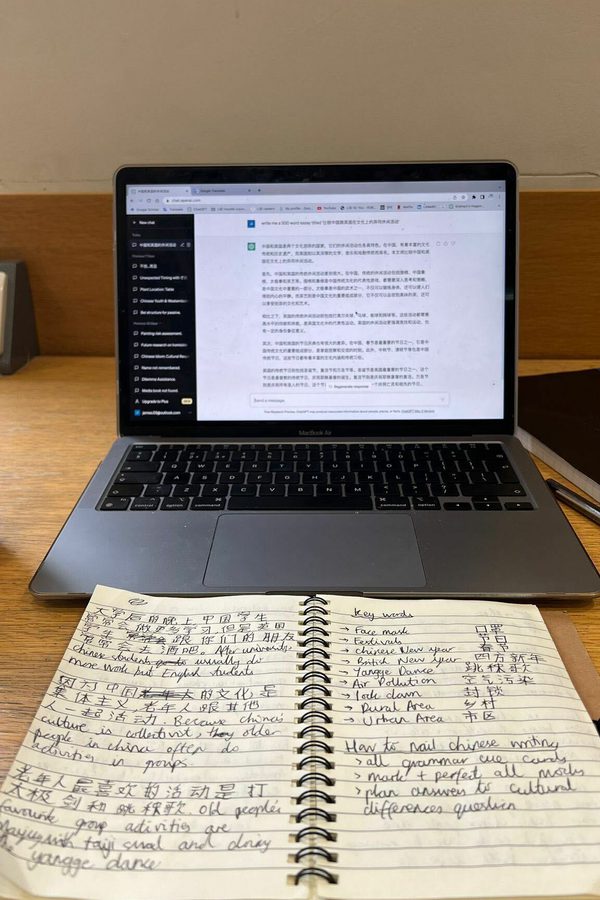
What’s it like to study an Ab-Nitio Language at University?

By James Roberts – 19th October 2023
Whether you’re a logical linguist looking for a challenge or find yourself compelled to explore the international nature of a specialism, you might be interested in trying your hand at an ab-nitio language. After 5 years of studying French to a high level, and with admittedly dwindling interest in the literature component of language learning, ab-nitio Mandarin Chinese called my name. Setting out to explore a new alphabet at the London School of Economics was a daunting yet exciting possibility. My fascination with Sociology evolved from studying Economics A-Level and I couldn’t refuse a chance to study this subject with a specialism in Mandarin Chinese.
By no means was straying away from my well solidified roots and loyalty to the French Language an easy choice - but I felt that University was an opportunity for challenge and redirection rather than a route of similar progression. My French had got to where I wanted it to be (a level of professional fluency), and although it’s difficult to pinpoint the exact moment when I realised that my goals had been met, but the beauty I find in language learning is that you will never think that you’re good enough until you realise that you were all along.
Taking this spirit with me into the University lecture hall kept my motivation alive through an undoubtedly difficult first year. Whilst new linguist friends complained about cross overs from A Level content, I struggled in my 10 hours of contact a week to master writing simple sentences. What kept my spirit alive every day to get up and continue was the learning. In ab-nitio language classes (beginner; for the non-linguists here), you are learning, executing and mastering something new every minute within the classroom. Looking back at 2021 me, who couldn’t even tell you how to say ‘hello’ in Chinese, it is clear how far I’ve come. It’s this feeling of accomplishment and active learning that is unique to an ab-nitio course.
So, enough about me and my glorified ego project, let’s talk about what you should know before you set off on an ab-nitio course, and if you haven’t thought about whether you should do one yet, let this be a sales pitch as I ask some key questions…
Do you know the expectations of your course?
Understanding your language specific expectations of your course and institute is important. Some unis expect you to come with a very basic understanding of the language, whereas some will want you to have no background in the language at all. In both cases my advice would be to familiarise yourself with the basics of the language. Because a) you need to make sure that it’s the right language for you and b) it’ll make the first few weeks easier. It’s wholly important to make the first few weeks easy for yourself because you’ll be setting up life away from your family in a new city and more than likely be having a lot of alcohol-fuelled late nights. Such hangovers are, let's say, sub-ideal if you are attempting to pick up a new language truly from scratch.

What are the weightings of your modules and how long are your contact hours? (prepare yourself: this is a long one!)
Understanding the contact hours and module weightings within the course is the other important aspect of preparation. Quite often the contact hours between modules will be massively uneven but the weightings of each module will be equal. For example, my Chinese language classes made up 60% of my contact hours but equated to only 25% of my first-year grade. Creating a practical plan of how you’re going to manage your time and non-contact hours will make it significantly easier for you in the first few weeks as you adapt to a module style of education.
In regard to contact hours, there is a fine line between too little and too much. There have been times where I have left a 2 hour class and thought that I could’ve done with an extra hour of contact to fully get to grips with a new particle of grammar, yet on occasions I have sat at the back of a different 2 hour lecture thinking that my time would be better spent if I were locked in a booth alone on the 3rd floor of the library perfecting my character writing. There are a wider range of teaching methods in language departments so I have tried to summarise the most common below. Don’t hate me if I miss one though!
Standard Class: Ranges between 1 hour and 2 hours in length and are comparable to GCSE and A Level type learning. These are usually more common in lower levels of language study. Class sizes typically below 10.
Lecture: Usually 1 hour in length and are lecture style ways of teaching content material such as cultural and historical aspects of the course. These can be conducted in the target language in higher levels of study. Class sizes typically full cohorts.
Seminar: Ranges between 30 mins and 1 hour in length and are follow up contact hours after a lecture. This provides you with opportunities to ask questions and discuss themes brought to light in a lecture hall. These can be conducted in the target language in higher levels of study. Class sizes typically like standard classes.
Vocab builders: Ranges between 30 mins and 1 hour in length and are classes dedicated to the acquisition of vocabulary. (As well as being painstakingly boring) these classes are normally conducted in non-romantic script language classes and are in place to help learn a new way of writing. These only occur in ab-nitio level classes.
Reading class: Ranges between 30 mins and 1 hour in length and are classes dedicated to debate regarding readings. These are usually conducted in the target language and occur in the highest levels of study.
Oral class: Ranges between 30 mins and 1 hour in length and are classes dedicated to group talking and discussion. These are usually conducted in the target language and occur in the highest levels of study.
1 to 1 speaking practice: Ranges between 10 and 30 mins and are conducted by a native speaker (usually online). These are often optional and if you are able to see past the awkwardness of broken communication with a stranger online then these are without a doubt the most valuable contact hours.
What is the focus of your course?
Every language course has a different focus. Some focus on the language, in relation to grammar and vocab, some, the cultural side of using a language, in relation to cultural differences, and some, the practical application of the language within a specific academic/workplace context. Knowing what your course focuses on will help in picking a top-choice uni. Allow the focus of the course to align with your motivations for studying the course.
If you made it this far, I hope I haven’t put you off! But remember, there is always more to life that mastering a new language straight away. It’s a process, and (in my biased opinion) the most enriching and academically rewarding one you’ll ever have the pleasure to do! If you take one thing away from this spiel then make sure you know what you’re getting yourself in for! Research, research again and then do it again for good luck. Don’t let the academic side of your new life shock you because trust me, doing your own washing and ironing will!
Fancy learning more about studying ab-nitio Chinese at uni? Sign up to get a mentor like James. Or sign-up to mentor on your subject if you're a university student (and cop some other sick benefits too).















